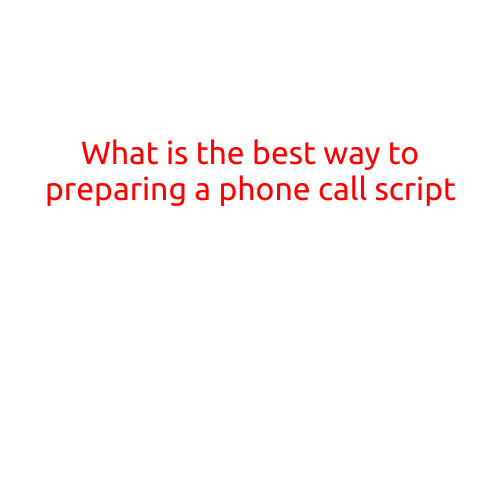
What is the Best Way to Preparing a Phone Call Script?
When it comes to making phone calls for business or personal purposes, having a well-prepared script can make all the difference in achieving your goals. A script helps you stay focused, ensures you cover all the important points, and reduces the likelihood of forgetting crucial information. But how do you prepare an effective phone call script? In this article, we’ll explore the best ways to prepare a phone call script and maximize your chances of success.
Define Your Objective
Before you start writing your script, it’s essential to define what you want to achieve from the call. What is the purpose of the call? Is it to schedule a meeting, close a deal, or gather information? Having a clear objective will help you stay focused and ensure your script is tailored to meet your needs.
Identify Your Audience
Since you’ll be speaking to someone over the phone, it’s crucial to consider your audience’s perspective. Who are you calling? What are their pain points, needs, and concerns? Understanding your audience’s mindset will enable you to tailor your script to resonate with them and address their issues.
Keep it Concise and Focused
Phone calls are typically short, so it’s essential to keep your script concise and focused on the key points you want to cover. Aim for a script that’s around 1-2 minutes long, depending on the call’s purpose. Avoid using jargon or overly technical language, and make sure your script is easy to follow.
Organize Your Thoughts
Break down your script into Introduction, Body, and Conclusion sections. The Introduction should introduce yourself, establish a rapport with the listener, and state the purpose of the call. The Body should cover the main points you want to discuss, and the Conclusion should summarize the key takeaways and next steps.
Use a Conversational Tone
Phone calls are meant to be conversational, so make sure your script sounds natural and friendly. Avoid using a rigid, formal tone that may come across as insincere. Use a conversational tone that’s relaxed and engaging, and don’t be afraid to show your personality.
Practice Makes Perfect
Before you make the call, practice reading your script out loud a few times. This will help you feel more comfortable with the words, tone, and pace. It’s also a good idea to record yourself and listen back to identify areas for improvement.
Be Flexible and Adaptable
Phone calls can be unpredictable, and things may not always go as planned. Be prepared to deviate from your script if necessary, and be flexible when it comes to accommodating your caller’s needs or concerns.
Use Visual Aids and Notes
Keep a cheat sheet or notes nearby to refer to during the call. This can include key statistics, data points, or questions to ask your caller. Visual aids like charts or diagrams can also be helpful in illustrating complex information.
Record and Review
After the call, take a few minutes to record a brief summary of what was discussed, what was agreed upon, and any action items that need to be taken. Reviewing the call will help you identify areas for improvement and ensure you covered all the key points.
In conclusion, preparing a phone call script requires a combination of planning, organization, and practice. By defining your objective, identifying your audience, and keeping your script concise and focused, you’ll be well on your way to making effective phone calls that achieve your goals. Remember to be flexible, use visual aids and notes, and record and review your calls to continually improve your skills.





